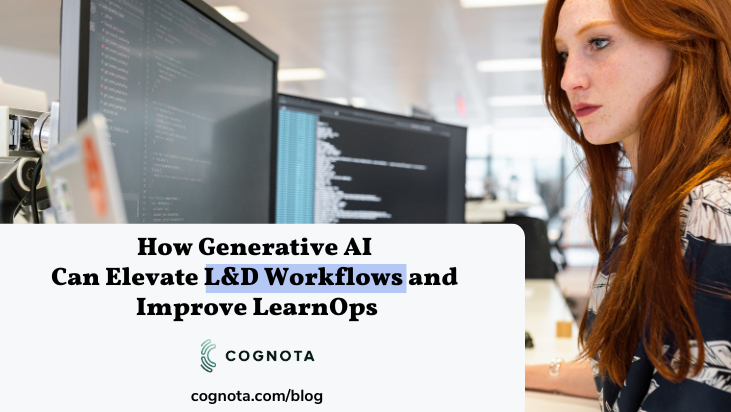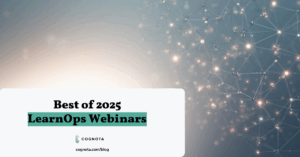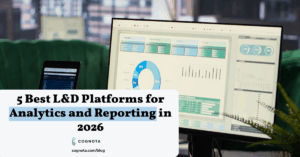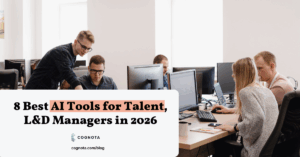On Thursday, November 16, 2023, at 12:30 pm ET, Cognota hosted a webinar, AI in the Flow of Work: Elevating LearnOps Workflows with Modern Technology, to explore the intersection of AI, IT, and learning operations – Watch the on-demand recording here!
Cognota founder and CEO Ryan Austin was joined by Matthew Ball, VP of Engineering and Data Science at Cognota; Jessica Knox, CEO of learning services agency Metrix Group; and Mike Hruska, founder and CEO of AI technology developer Problem Solutions.
The event started off with a big-picture overview of generative AI: essentially, what is it and how does it work?
Much more than content creation
Artificial intelligence capable of generating text, images, or other media using models, generative AI has been shown to vastly increase productivity, especially for those who have received training in it.
Matthew explained how generative AI doesn’t have to be used to simply create content; it can also greatly assist in the entire lifecycle of a learning project, including the analysis, design, development, implementation, and evaluation stages.
Essentially, generative AI can be used to accelerate ADDIE, the instructional design model that is a mainstay of the L&D industry.
The webinar went on to demonstrate Cognota’s LearnOps AI, in which generative AI supports all components of LXD (learning experience design), including curriculum design, learning objectives, content strategy, and collaboration with SMEs.
Making sense of data, at scale

The ability to capture insights quickly and at scale has been shown as another benefit and promise of AI. Jessica Knox took the floor to explain what she’s seeing as far as users implementing AI to quickly and cost-effectively extract insights from large volumes of unstructured data. Raw text can be turned into insights, delivering for an L&D team topic discovery, sentiment analysis, and document summarization.
This is often helpful for teams that might already have access to analytics tools but are restricted by what those analytics tools are capable of discovering. For example, analytics managers need to instruct the platform to seek out patterns based on a certain set of criteria.
On the other hand, generative AI can unearth trends that might not have been imaginable to learning managers, such as learners moving too quickly through a course, learners getting the same question correct too often, and other subtle, nuanced insights that weren’t expected.
Getting buy-in and de-risking AI
Finally, Mike Hruska explained how an L&D team can get buy-in from IT to implement AI. Since OpenAI’s ChatGPT burst on the scene in November 2022, conversations about how to acquire and implement AI technologies across the enterprise have become increasingly common across all departments, including the C-suite.
Unfortunately, however, there are now multiple, competing solutions on the market as well as a growing number of concerns about the risks.
Mike went on to explain how learning leaders can take a more strategic, longer-term view of AI and work with their IT resources to develop an ideal implementation. An AI partner needs to not only demonstrate productivity gains but also address any anticipated concerns, such as those related to data governance, privacy, security, and compliance.
As companies strive to create a culture of learning and develop courses based on the acquired knowledge of their subject matter experts, without proper controls, proprietary content can be used to train models that the AI vendor can leverage and sell to other customers.
Final thoughts
The webinar wrapped by asking participants to send in their questions. One question raised revolved around the high costs associated with AI subscriptions. Matthew Ball offered valuable insights, suggesting that with the evolution of AI technology, older models are gradually becoming more budget-friendly. Additionally, he pointed out that opting for open source models, where you host the machine yourself, might prove to be a cost-effective alternative in certain situations. Looking ahead, it’s clear that the AI landscape is evolving, and we can anticipate increased adoption and the emergence of more affordable options in the near future.
If you’d like to hear the expert’s opinions in full, check out the on-demand recording of the webinar here.




